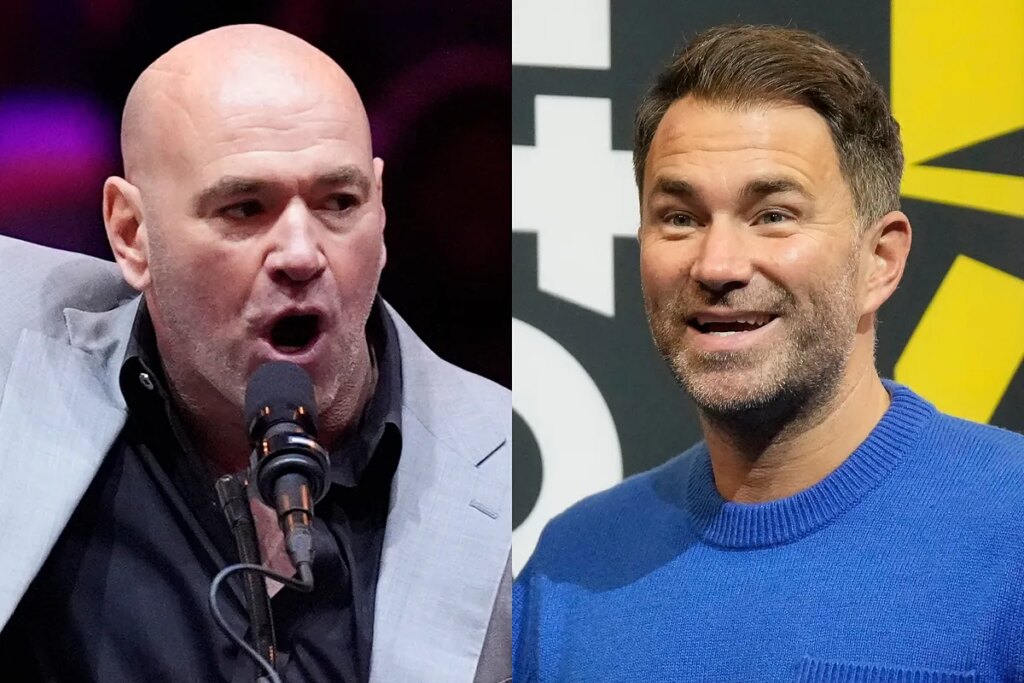Dana White, the name synonymous with transforming the UFC into a global sports juggernaut, is now making waves in a different arena: boxing. After building the UFC into an $11.3 billion empire, White hinted earlier this year at a serious foray into the boxing world. That intention took its first tangible step in September with the Callum Walsh vs. Przemyslaw Runowski bout in Dublin, hosted under the UFC Fight Pass banner. The event, marked by slick production and effective promotion, was a shot across the bow for traditional boxing promoters.
Among those taking notice was British boxing heavyweight Eddie Hearn, who admitted during a candid moment on the PBD Podcast that he envies White’s level of control within the UFC. Hearn’s words, “I am very jealous of the almost complete control they have over their talent,” sent ripples through both sports industries, sparking a discussion about whether White’s model could disrupt the fragmented world of boxing.
Addressing Hearn’s comments during an interview on the Noah Kara podcast, White didn’t hold back. While acknowledging the difficulties of negotiations in any sport, he pushed back on the idea that his job was any easier. “Negotiations are tough over here, just like they are anywhere,” White said. “But we’re fair, and the money is spread out between all the fighters. That’s what makes the difference.”
The difference White refers to lies in the structure of UFC contracts, which often span multiple fights, creating stability for fighters and predictability for promoters. Boxing, in contrast, operates on a fight-by-fight basis, where contracts are negotiated for every bout. It’s a system that Hearn himself has admitted complicates efforts to maintain control, let alone achieve the UFC’s streamlined efficiency.
Dana White’s boxing ambitions: A battle of models and philosophies
This clash of philosophies comes as White’s boxing ambitions stir both curiosity and skepticism. British promoters, including Hearn, have questioned whether White can replicate his UFC formula in boxing. Hearn suggested that White might focus on developing a “smaller league of guys you’re not aware of” rather than pursuing the sport’s biggest stars-a strategy that could redefine how boxing promotions are built.
White’s entry into boxing also reignites discussions about fighter pay, an issue brought into sharp focus by former UFC heavyweight champion Francis Ngannou. Since leaving the UFC, Ngannou has pursued high-profile boxing bouts, reportedly earning around $30 million despite losses to Tyson Fury and Anthony Joshua. While Ngannou’s story underscores boxing’s earning potential, White has remained dismissive of the narrative surrounding his former fighter.
“It doesn’t matter to me. But that’s a fact. He was offered more money because I know the real numbers. That’s not necessarily true. That’s the bullsht publicly that people believe, but that’s not the truth. White said at a recent UFC 308 press conference. “Total bullsht, total bullsh*t. That’s that whole myth that makes everybody go.” His response highlights the ongoing tension between boxing’s one-off payday model and the UFC’s structured contracts, with White firmly defending the sustainability of his approach.
As Dana White doubles down on his push into boxing, the battle between two promotional philosophies seems destined to escalate. Whether White’s control-driven model will thrive in boxing or face resistance from its entrenched traditions remains to be seen. For now, Eddie Hearn’s admission of “jealousy”may be the first of many acknowledgments that Dana White’s playbook is forcing a rethink in the fight game.
Read the full article here


